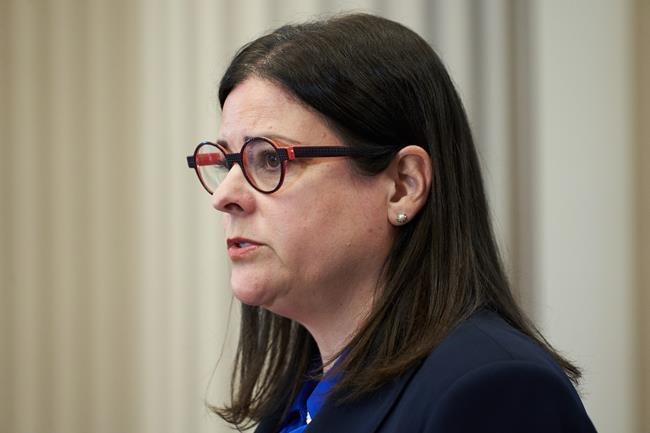WINNIPEG — The Manitoba government is open to the idea of a wide-ranging review of its taxes to remain competitive with other provinces, Premier Heather Stefanson said Thursday.
"We're always looking at better ways to deliver services to Manitobans and being competitive with other provinces is absolutely key to that," Stefanson said during a question-and-answer session with the Manitoba Chambers of Commerce.
"I want to look at taxation overall ... I want to sit down with people in the business community and others, and just figure out what would that balanced approach be to ensure that we're moving in the right direction," Stefanson said afterwards.
Among the taxes that Stefanson said would be looked at is what's commonly called the payroll tax. It applies to employers when the total of what they pay out in wages exceeds a certain amount and doesn't exist in other Prairie provinces.
"It's really an anti-growth tax for businesses in Manitoba," chambers president Chuck Davidson said in an interview. The last major tax review in the province was about 25 years ago, he added.
The Progressive Conservative government has chipped away at the payroll tax at times. Most recently, this year's budget raised the threshold at which companies start paying to $2 million from $1.75 million in total remuneration.
Davidson would like to see the tax eliminated. Income taxes need to be lowered as well, he said. Manitoba starts charging higher tax rates at lower incomes than neighbouring provinces.
"That's something that we had been on par with (other provinces) about 20 years ago, but we've lost pace on that," he said.
Davidson acknowledged that Manitoba doesn't have the kind of energy revenues that Alberta and Saskatchewan have to bolster revenues and keep taxes down, but said tax competitiveness is key to keeping workers from leaving.
Stefanson cautioned that the government cannot move too quickly as it is still working to balance the budget.
"We can't change things overnight and we need to take a responsible approach to that."
With the exception of a small surplus in 2019, the Manitoba government has not recorded a balanced budget since the fiscal year that ended in March 2009. Stefanson has promised a return to balance by 2028.
The Opposition New Democrats said the government should first focus on rebuilding a health-care system that has been overwhelmed during the COVID-19 pandemic.
"Right now, the priority has to be fixing health care and fixing education," leader Wab Kinew said.
The Tories have already made a wrong move in tax changes, he said.
The government has issued rebates for the provincial education tax on properties in recent years. The rebates are based on a percentage of each property tax bill, so owners of large homes, office towers and shopping centres are getting the biggest refunds.
"This government is giving away these massive million-dollar cheques to big billion-dollar companies," Kinew said. "I don't think most Manitobans would agree with that at a time when our health-care system is struggling."
This report by The Canadian Press was first published May 12, 2022.
Steve Lambert, The Canadian Press



